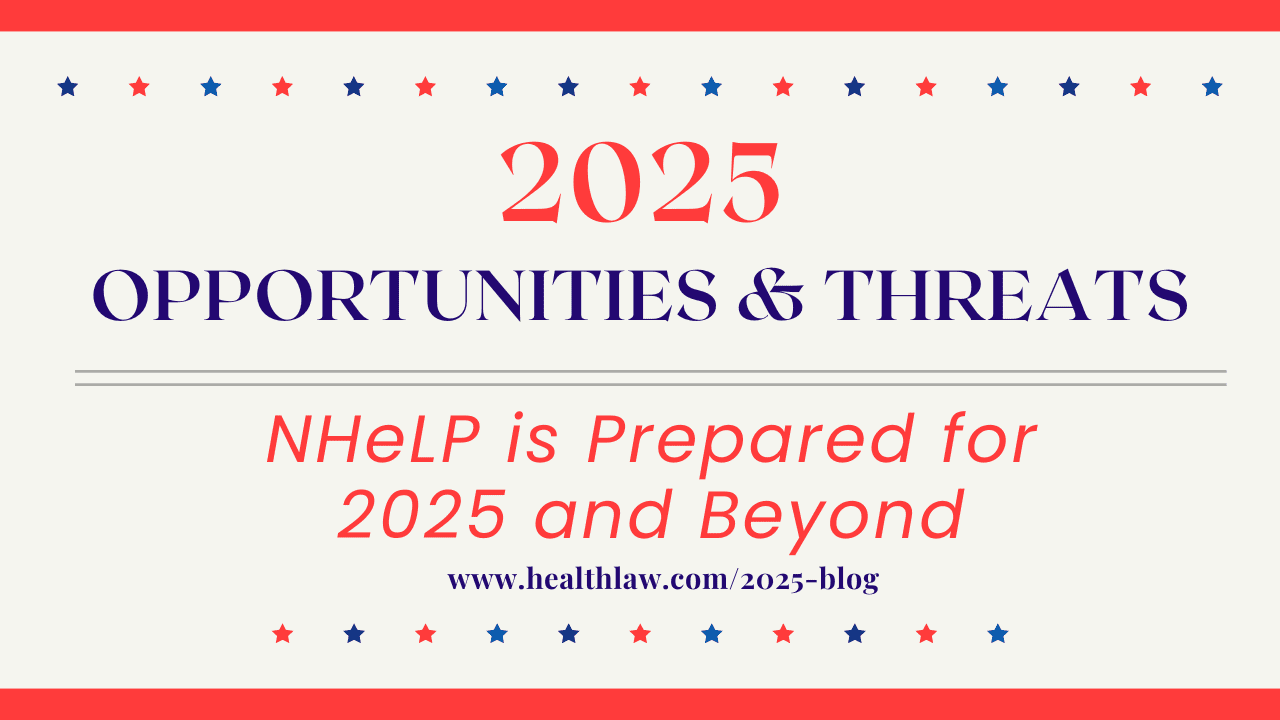NHeLP Prepared for Threats and Opportunities in 2025
The upcoming election in November will have a significant effect on health care across the country. Candidates at the federal and states levels may propose policy proposals that could have a profound impact on health law and policies in 2025. In this new blog, NHeLP experts will analyze and discuss the impact of various policies on access to care, for low-income people and people with disabilities. They will also examine the impact of policies on LGBTQI+ people, pregnant women, and people who live at intersections of these identities. Follow NHeLP as we explore the opportunities and threats facing health care in the United States. Who will be the President; who will control both the House and Senate? Will state leaders who are elected be committed to ensuring their people have access necessary health care? How will this new power mix affect people with low incomes, or those who face discrimination when it comes to accessing essential health care? Throughout the fall, we will be publishing a series of thought pieces that will outline threats we are preparing to defend against and opportunities we will be ready to take advantage of, based on what we have experienced in the past, on policies and goals that have been identified in publications like Project 2025, and on the collective thinking of NHeLP and our partner organizations.
I would like to share a few thoughts as I introduce this series. We have been through this before. NHeLP has worked for more than 55 year to ensure access to healthcare, to advance health equity and to enforce civil right. We have helped to expand Medicaid under many different federal and states administrations. We have played a key role in shaping Medicaid policy and law to provide better and more care, and to give teeth laws prohibiting discrimination. We have fought against past attempts to balance budgets on the backs of low-income people and those with little political power. We have used the court system to stop government actions which violate our Constitution and laws. We will resist work obligations and other obstacles based on the anti-worker liar that low-income individuals don’t work enough. We will not tolerate discrimination, including when it is disguised as “religious freedom,” because discrimination against people in the health care system is illegal and can lead to deadly consequences. We will fight against efforts to strip funding and consumer rights in the ACA and rollback federal oversight of Medicaid. We may even see efforts to withhold funding from states that don’t tow the administration’s policy line and instead dare to provide reproductive health care and gender-affirming care, or to provide health care to immigrants.
We will use the same strategies and strengths to take advantage of opportunities to advance toward the health equity that is our north star. We hope to close Medicaid gaps, strengthen services for people with disabilities, ensure that our children have the health care to thrive, improve data collection to address health inequities, guarantee sexual and reproductive health care that does not stop at state borders, and better protect individual health rights.
Through this series, we will be pleased to share with you in greater detail our insights into the threats and opportunities we see ahead. We will also lay the groundwork to protect Medicaid by making sure that policymakers and advocates fully understand how Medicaid functions and why it is so important to 80 million Americans, including children, people with disabilities and people of color. It is also vital to pregnant women, people in need of sexual and reproductive health and seniors. Medicaid will remain a vital part of our collective future no matter what happens in the November elections. Our country will only be strong if everyone can thrive. NHeLP will marshal its strategies and strengths to protect those whose health care is dependent on us. This includes education, advocacy and enforcement. Threats and opportunities can vary from state to state, while others will be of national scope. NHeLP, with its deep relationships with state and national partners is prepared to identify threats, determine the most effective resistance methods, and seize opportunities in order to achieve the goal that many of us share: that everyone in the United States will have access to the health care and resources they need to thrive.






